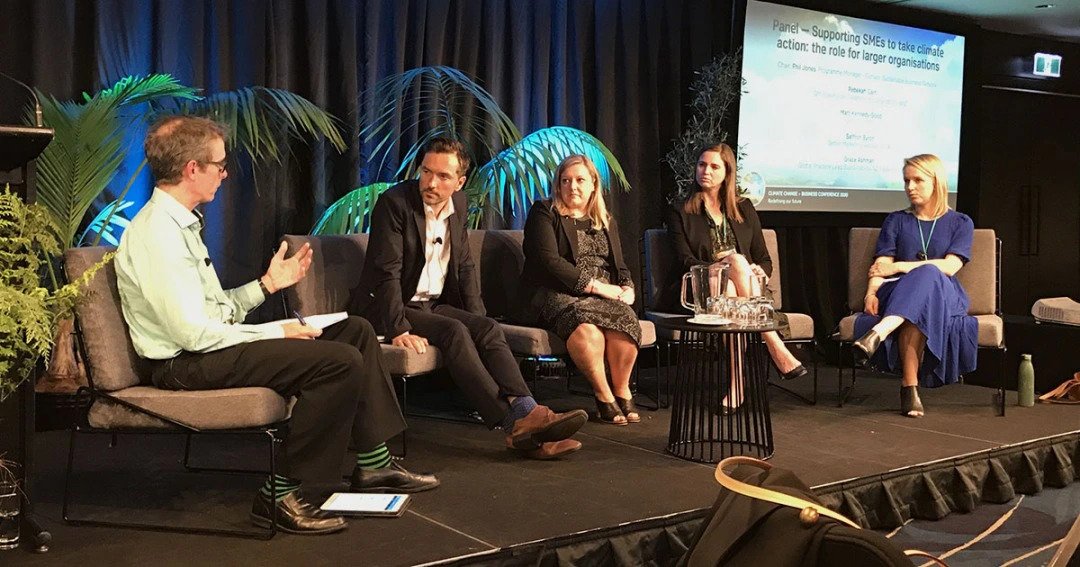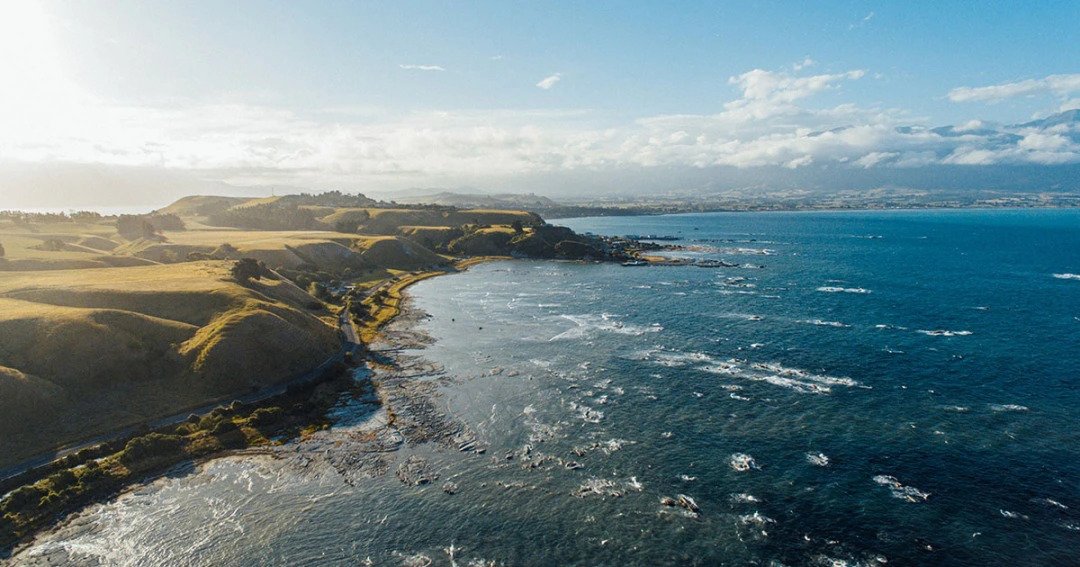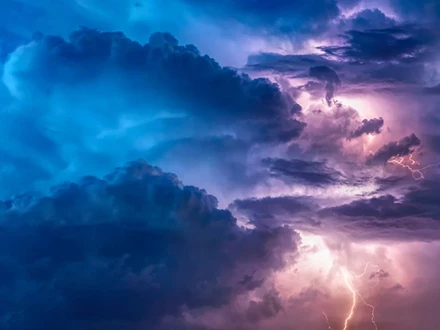Speaking to about 450 delegates at New Zealand’s annual Climate Change + Business Conference earlier this month, she described climate change as the largest of several waves, including biodiversity loss and the Covid-19 pandemic, that were “crashing or about to crash onto shore”. She said the combination of crises were interlinked and needed to be addressed together.
“Despite the fact that scientists have told us these crises are coming, we haven’t really paid attention.
“This is the golden opportunity. We are a privileged generation to be able to do this. Our parents did not have the tools. For our children it will be too late. We are the generation that has to turn this around.”
Here’s a summary of that theme, which was echoed throughout the two-day conference, along with some of the other key topics. You can also view video recordings of all the presentations.
The next decade is critical
The science shows we need to cut carbon emissions in half by 2030. We’ll then have until 2050 to cut global emissions to net zero. Those reductions are vital if we are to have any chance of limiting warming to 1.5°C. If we go above that threshold the impacts are likely to be catastrophic. Warming is already above 1.0°C.
In a pre-recorded interview Christiana Figueres said: “Either by 2030 we will have cut our greenhouse gas emissions by one half, as compared to what we have right now, in which case we'll open the door to a thriving world that will be more socially equal, that will be more healthier, more efficient, or, if we don't do that then we really have condemned ourselves and our children to a world of constant and increasing destruction and untold human misery.”
She said we needed to be stubbornly optimistic.
“I think we'll look back at 2020 as a reset year where we reset the financial system, we reset our commitment to carbon neutrality, to zero net emissions. This is going to be an amazing year.”
Professor Johan Rockström, Director of the Potsdam institute for Climate Impact Research said there was no question the world economy would be decarbonised.
“The question is will we do it fast enough to avoid crossing tipping points that would take us irreversibly towards a pathway that could not support humanity in the future?”
The current situation
Internationally there has been some progress. The European Union has committed to cutting emissions by 55% by 2030 and net zero by 2050. China has committed to net zero by 2060 and the US has indicated it will commit to net zero by 2050. Japan has also committed to net zero by 2050. As Professor Rockström said, that means the four largest economic units have all tied themselves to transformation over the next 30 years.
Minister of Climate Change, James Shaw outlined the frameworks introduced by the New Zealand Government over the past three years. They included passing the Zero Carbon Act, setting up the Climate Change Commission, reforming the Emissions Trading Scheme, reintroducing climate change into the Resource Management Act, establishing Green Investment Finance Limited and announcing a move to compulsory climate risk reporting for large institutions.
Next year the Climate Change Commission will release its advice on setting New Zealand’s emissions budgets to stay within the 1.5°C threshold along with a plan for achieving them. James Shaw said that what he knew from the science suggested those budgets would be “pretty shocking” to most people and the constraints were likely to be “quite extraordinary”.
Chair of the Commission, Dr Rod Carr said the pace of change would be critical.
“'Balancing that pace of change argument is, at the end of the day, going to determine whether we are able to cross the finish line of what is a marathon, not a sprint."
The Commission will also provide advice on a target for methane reduction as it currently ranges between 24 and 47% by 2050.
A number of speakers pointed out New Zealand’s response, to date, had been slow and weak and was not creating the change at the required level. They called for more ambition.
"We find ourselves in a situation where we have more intent than commitment, more hope than action, more promise than delivery and therefore much, much more to do," said Bryce Davies, IAG’s Executive Manager Corporate Relations.

SBN's Phil Jones, left, at the Climate Change + Business Conference talks about a new climate action toolkit for smaller businesses that will be released in New Zealand next year.
Lessons from Covid-19
One of the strongest messages was to heed the lessons from the global Covid-19 pandemic and to apply them to taking action on climate change.
Most speakers referred to the pandemic and the parallels with climate change saying they were the two greatest challenges facing this generation. There was general agreement that Covid had had been a wake-up call and had shown us what volatility and uncertainty looked like. The pandemic had also taught or reminded many that our wellbeing was connected to the natural environment and stressed the need to invest in nature. The New Zealand response to Covid-19 also demonstrated how quickly New Zealanders could collaborate and innovate.
Dr Anne Bardsley, the Deputy Director of Koi-tu: The Centre for Informed Futures perhaps summed it up best: “Covid has given us a glimpse of the potential worst case scenario - a shutdown of our economy and social interactions. We now need to consider how to build a more inclusive, sustainable and resilient economy and society for the long term. Deep transformations are going to be needed.”
About $12 to $13 trillion in debt capital (a total that’s likely to go higher) has been injected into the global economy to recover post-Covid. Christiana Figueres said we now have to make that count as “we’ll be going into debt and it is our children that will have to pay it back”.
The pandemic had a short term impact on climate change with daily carbon emissions dropping by about 10% in the first half of the year when most countries were in lockdown, said Professor James Renwick. Most reductions came from the transport sector and provided the added benefits of improved air quality and public health.
"The decreases we've seen this year, I guess you could say, have been a step in the right direction although for terrible reasons...but it's that kind of reduction that we need to lock in through transformations in the economy that will get us off this path.
Conference Moderator Rod Oram, picking up on a theme of investing in the future, noted a quote from a report released by Oxford University earlier this year. It read:
“Covid-19 has already triggered major shifts in individual behaviours, social practices, beliefs, the role of government in the economy and relationships between nations and international institutions. These shifts have occurred on remarkably rapid timescales.”
Action and collaboration
Nearly everyone talked about action and collaboration. It’s probably safe to assume that happens at every conference but, in the wake of Covid, it’s likely those terms carried more meaning and momentum this year.
A number of speakers said there had been a lot of talk about action in the past but so far little had been taken. They noted that while most people were aware of the impacts of climate change they didn’t know who should be taking action and what that action should look like. Some of those answers were provided during sessions that focused on areas including energy, transport, construction, forestry and food.
Minister for the Environment David Parker said New Zealanders had a responsibility to work together, not just on Covid but also climate change and other challenges like water quality.
During a session on Māori perspectives on climate action Johnnie Freeland, Ngāti Te Ata Waiohua, said indigenous communities had 1000 years of experience in New Zealand, and 50,000 years in the Pacific to draw on.
“There's 1000 years of wisdom that sits in this place that can help with the 180 years of degradation...and the opportunity really is how do we harness mātauranga Māori or Māori knowledge systems alongside Western science to co-navigate a way forward.
“If we can play our part, Papatunuku will regenerate herself. Covid has been like a lesson of humility and we can see in other places around the world where they haven't quite got that message.”

Latest science
Professor Rockström presented what he described as the important scientific finding of the year using a climate model covering the past 3 million years.
It revealed that changes in the average global temperature had stayed within a “very narrow corridor” and never gone above 2°C of warming. However, that was followed by a warning that we’re now “at the warmest temperature since the last ice age and on a trajectory to over 3°C warming - a place we haven't been in the past 10 million years.” Professor James Renwick said there had been an exponential rise in carbon emissions since the start of the industrial revolution. He, along with a number of others, stressed the importance of lowering emissions as soon as possible.
“If we can reduce emissions by half by 2030 and get to net zero emissions by 2050 we can actually save the future. It's up to us to determine what the future looks like.”
Professor Renwick also said new modelling suggested a doubling of carbon in the atmosphere could increase heating faster than scientists had predicted in the past.
Professor Rockström said that at 1.2°C warming, economies were already being hit severely. In 2020 we had unprecedented forest fires in Australia and California, floods in Bangladesh and another heatwave in Europe. All were attributed to global warming. He pointed to a study that showed nine out of 15 possible tipping points were getting close, like the reduction in Arctic sea ice and frequent droughts in the Amazon rainforest.
He stressed that in addition to decarbonising the world's energy system we also needed to maintain carbon sinks to have a chance of delivering the Paris climate agreement. He said there was “concrete evidence” that we were moving in the right direction due to “political progress, market forces and technological disruption”.
Russel Norman, Executive Director of Greenpeace, pointed out that New Zealand Government figures showed that between 2017 and 2030 our country was on track to increase net emissions by about 16% with a 7% drop in gross emissions.
“When you think we're meant to be doing a 50% drop in that period I think it gives you a sense of how far off track we are. The reason is really simple. We don't have any policies to cut emissions out of the agri-business sector which is half our emissions. There's no real policy in transport. We have policies to increase our net emissions and marginally cut our gross emissions.”
Energy and transport
Decarbonising our energy and transport systems is key to reducing New Zealand’s emissions.
Currently about 40% of New Zealand’s total energy needs comes from renewable sources. About 80% of our electricity is generated by renewable sources and the government is aiming to increase that to 100% by 2030. Dr Rod Carr said while that target was “laudable, visionary, inspiring”, the real challenge was going to be driving our renewable energy “way beyond 40% and very quickly”. Improving our energy efficiency was going to be vital, he said.
Russel Norman said the business case for electrifying the New Zealand transport system was profound.
“Instead of importing billions of dollars in transport energy in the form of fossil fuels from the Middle East and everywhere else, let's generate our own transport energy, electrify the New Zealand transport fleet, save ourselves billions of dollars in terms of our current account deficit and decarbonise the transport system.”
Other options for decarbonising the transport system include increasing activity mobility - walking and biking.
Dr Paul Winton, from the 1point5 project, said building more transport infrastructure was going to have little impact on reducing carbon emissions. Using Auckland as an example, he said a simple 10% reduction in vehicle trips would cut emissions by about the same level as $20 billion in current or planned transport projects. Increasing cycling numbers, similar to Copenhagen, improving car emission levels and electrifying about a third of NZ's fleet would have a major impact on reducing emissions.

Working with nature
Professor Nathalie Seddon from the University of Oxford outlined the importance of nature-based solutions. She said these were actions that involved the protection, restoration or management of natural or semi natural ecosystems, the sustainable management of our working lands and the creation of novel ecosystems in and around cities.
She said nature-based solutions offered “huge opportunities” for New Zealand to address climate change and biodiversity loss while stimulating the economy.
“Nature is, after all, our life support support system and we ignore it, or undervalue it, at our peril. The evidence for that has never been clearer.”
Forestry is not the silver bullet
Planting trees is often used as an example of climate action. Several speakers said that while forestry could be a good short term solution, it could create problems in other areas.
Dr Rod Carr said the forests themselves would represent greater risks as the climate changed and the change in land use could lock away options for future generations. He said there needed to be limits on exotic forestries.
Professor Seddon said the expansion of forestry, framed as a climate change solution, was coming at the cost of carbon rich and biodiverse native ecosystems. It was also “threatening the livelihoods and the rights of local communities and indigenous people around the world”.
Behaviour change
Behaviour change is key to getting people to take action on climate change. While new ways of doing things exist, that doesn’t necessarily mean they will be adopted.
Dr Rod Carr said behaviour change was a much bigger question than just education.
“It's about how we use the best research, the best understanding of why humans behave the way they do and how you get them to behave differently. We need to figure out how to get people’s behaviours to align with what's good for the environment and good for them. The private sector has got a lot of that knowledge. They can convince us to do stuff every day.”
Councillor Sara Templeton from Christchurch City Council said behaviour change could provide “really cheap, really effective” ways of reducing emissions. As an example she said encouraging people to work from home one day or more a week helped lower transport emissions quickly without spending a lot of money.

